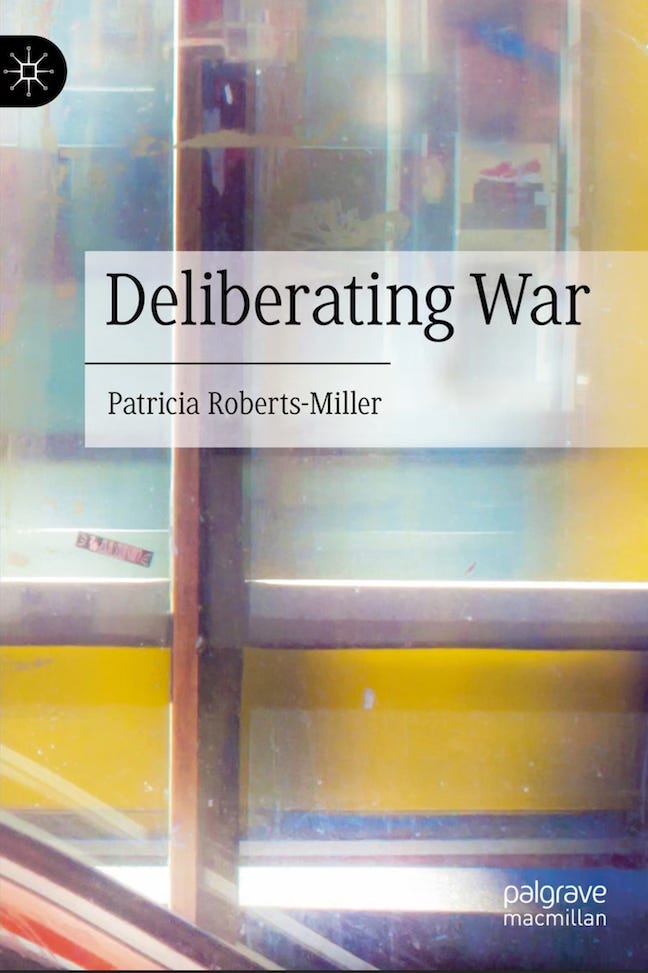“If we are in an apocalyptic battle between Good and Evil, then there is no place for the everyday politics of compromise, deliberation, fairness, reciprocity. What initially seems to be an effective solution (hyperbole and demagoguery) to an immediate rhetorical problem—how do I persuade people to adopt a policy (or support me) without relying on policy argumentation, since that probably wouldn’t work?—is a trap. At some point, hyperbolic rhetoric becomes threat inflation, and then that inflated threat becomes the premise of policies, both foreign and domestic. And then agreeing as to the obvious existential threat posed by the Other and uniting behind the obvious policy solution is a necessary sign of being on the side of Good. Thus, the rhetoric of existential war inevitably has democratic discourse itself as one of the first casualties.”
Here is a recent conversation my friend Johanna Hartelius and I had with Patricia Roberts-Miller about her new book, Deliberating War.
Formerly Professor of Rhetoric and Writing and former Director of the University Writing Center at the University of Texas at Austin, Trish retired from full-time teaching in order to have more time for writing, hosting workshops, visiting campuses and classrooms, podcasts, and any other way she can get people to listen to her. She is also the author of Speaking of Race: How to Have Antiracist Conversations that Bring Us Together(Experiment 2021), Rhetoric and Demagoguery (2019), Demagoguery and Democracy(2017), Fanatical Schemes: Proslavery Rhetoric and the Tragedy of Consensus (2009), Deliberate Conflict: Argument, Political Theory, and Composition Classes (2004), and Voices in the Wilderness: Public Discourse and the Paradox of the Puritan Rhetoric (1999).
Show Notes
Summary
Patricia Roberts-Miller, an expert in rhetoric, discusses the power of language and the dangers of demagoguery in public deliberation. She explores how people talk themselves into making unforced errors and the regret that often follows. She also examines the framing of politics as war and the impact it has on democracy. The conversation touches on topics such as slavery, Nazism, and the current political climate. Roberts-Miller emphasizes the importance of respectful disagreement and the need for effective methods of handling conflict. In this conversation, Patricia Roberts-Miller discusses the importance of deliberation in political discourse and the dangers of rhetoric that aims to win rather than seek truth. She emphasizes the need for genuine disagreement and the ability to change one's mind. The conversation also touches on the challenges of teaching rhetoric in a polarized society and the impact of cancel culture on open dialogue. Roberts-Miller highlights the role of identity in shaping arguments and the need for reconciliation and understanding. Overall, the conversation explores the consequences of war-like rhetoric in politics and the importance of thoughtful deliberation.
Takeaways
Language has the power to shape public deliberation and can lead to unforced errors and regrettable decisions.
Framing politics as war can be detrimental to democracy, as it creates an environment of extreme polarization and demonization of the other side.
Respectful disagreement and effective methods of handling conflict are essential for a functioning democracy.
Understanding the historical context and consequences of rhetoric is crucial in order to avoid repeating past mistakes.
In-group loyalty and moral licensing can hinder self-reflection and accountability. Deliberation is essential in political discourse and should prioritize seeking truth over winning arguments.
Genuine disagreement and the ability to change one's mind are crucial for productive dialogue.
Cancel culture and the fear of being canceled can hinder open and honest deliberation.
Identity plays a significant role in shaping arguments, and recognizing this can lead to more understanding and reconciliation.
War-like rhetoric in politics can have serious consequences and should be approached with caution and thoughtful deliberation.
Sound Bites
"I'm interested in times that people talk themselves into unforced errors."
"Demagoguery first, and then you get a demagogue. They don't create it. They just ride the wave."
"Democracy is about people disagreeing. And so if you're going to say that people can't verbally disagree, then you're saying democracy can't function."
"Is it still demagoguery if it's boring?"
"Can deliberation be demagoguery if it's boring?"
"Democracy can be a casualty of rhetoric without deliberation."















Share this post